The Complications of Sex
The Sex Myth
“Here’s the deal. You came to watch a play called The Sex Myth.” While this statement may sound simple, it is anything but. Things are rarely simple when it comes to sex. And that’s exactly what this play is about.
Based on the nonfiction book of the same name by Rachel Hills, The Sex Myth: A Devised Play is a deeply personal, startlingly moving production presented at the HERE Arts Center in New York City this past August. And that’s only the experience of the people who are watching the show, to say nothing of the people who created it. The 75-minute play consists of a series of personal monologues, written and performed by a diverse eight-person ensemble, that examines what sex means to them and how it has affected their lives.
These performances encompass everything from surviving childhood abuse, having sex for the first time, how one’s racial identity affects ideas of masculinity or femininity, identifying as bisexual, how body image impacts sexual identity, how age impacts sexuality…you get the idea.
When people talk about sex we often talk about it in a way that isn’t entirely honest. It’s not that we’re necessarily lying, but we’re trying to communicate a desirable self when we’re talking about sex to other people.
Each story is unapologetically intimate, and each story is unconventional. The performances reflect the content of Hills’s book, in which she examines the significance which sex possesses in our culture. Nowadays, the show opens with a mock Ted Talk stating that culture has come to the consensus: “Sex is good! Have sex. Have lots of sex.” So, in The Sex Myth: A Devised Play, they are “here to challenge what we’ve accepted as normal.”
That’s what Hills, a producer of the HERE Arts Center run, wanted. Following the release of her book, she led workshops at college campuses throughout the country, giving speeches and holding question and answer sessions. It was these workshops that inspired the idea of adapting her book to a play.
“The idea of these events is to get people thinking critically about their own sexual experiences and identities and how they interact with people around them in their communities,” she said. “Someone suggested an alternative way to do that is to have them write things down rather than speaking out loud. In a sense, creating a play is a combination of these two things. People go through that intense process of reflection that takes place when you’re writing something, then speak it out loud.”
It’s through that reflection that Hills says people can come to a more honest way to think and talk about sex, rather than the carefully curated way that depicts an ongoing narrative of idealized desire.
“When people talk about sex we often talk about it in a way that isn’t entirely honest,” she said.
It’s not that we’re necessarily lying, but we’re trying to communicate a desirable self when we’re talking about sex to other people. We’re throwing out fragments that hopefully are true, but they don’t tell the whole picture. They don’t tell the things that make us uncomfortable. The result of that is even though the vast majority of us are carrying around these parts of our sexual history that we feel insecure about, uncomfortable about, ashamed of, that just don’t fit the story of what we’d like to tell the world, and we feel alone in that. Because we don’t realize other people have the same shame and insecurities and complications. I think what’s interesting about the monologues in this iteration and previous versions—and the ones I hope to come—is people are telling the parts of their stories that don’t fit with the usual stories that they would tell about themselves.
In The Sex Myth: A Devised Play, these uncomfortable stories are told—and performed—in front of an audience. Under Hanne Larsen’s direction, people are invited inside the performers’ childhood homes, college dorm room beds, even on their daily commute as they endure aggressive street harassment. This last scene, written and performed by the trans performer Jari Jones, offers a painfully honest description of being objectified: “All my life I’ve been devoured by male consumption.” That one statement struck this critic, who is harassed on the sidewalk almost daily, deeply.
Each of the scenes inspired emotion and thought, as did the courage of the performers sharing their personal stories. Non Kuramoto invites us to join her on a journey of viewing sex as her “superpower” and her internal struggle of being emotionally vulnerable with the man who ended up becoming her husband. Sergio Castillo offers an unflinching look into how his racial identity and ancestral background affects his sexuality, as he questions the definition of masculinity, both outside and inside the bedroom. His inquiry, “Is that a man? Is that what men do?” made in a world overflowing with toxic masculinity, is piercing. A skit of one-syllable exchanges on Grindr are spoken with drumbeats struck in the background, offering an unflinching portrayal of the impersonal ways in which sexual connections are often made.
A woman is raped by her boyfriend in her college dorm room bed, but that isn’t the focus of Sherill-Marie Henriquez’s story—making the event even more poignant. Sach Dev enacts his history as a bisexual man, serving as the main character and the narrator, asking, “Do I attempt to reconcile it all?” Jennie Runk, a plus-size model, shares memories of her adolescence spent trying to “be normal” before she embraces being a lesbian and meeting someone who doesn’t care how much makeup she wears. Darius Journigan’s upbringing of strict Christianity and molestation is a background to the shame that permeated his life as a gay man, thinking, “Maybe God made a mistake.” And Claire Beaudreault reflects on her identity as a thirty-six-year-old woman, not a young sexual object but not an aged crone: “If you’re over thirty-five but under seventy-five, you’re invisible:” The undeniable truth of her statement resonates, as does her question: “Why do I subscribe to these beliefs?”
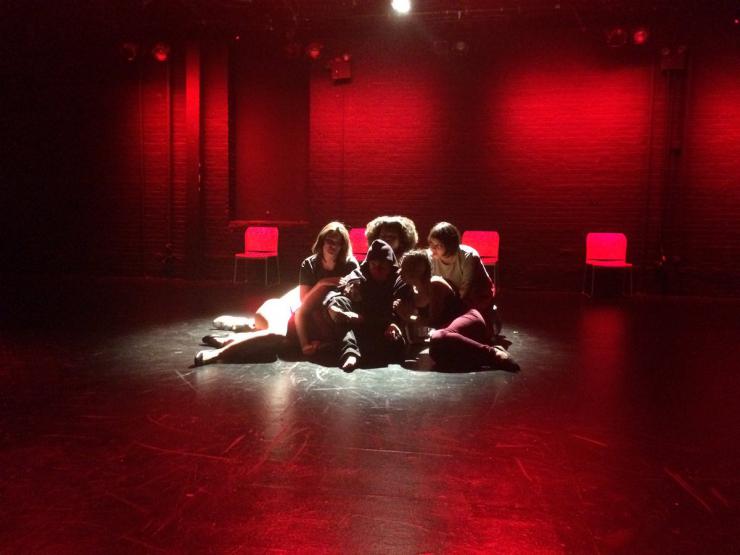
One story after another, each both inspiring and painful to watch. Every actor is extremely impressive, as is their ability to seamlessly move between characters in each scene. But they are hardly the only stories that can be told through The Sex Myth: A Devised Play; Hills hopes it will be presented around the world.
“From the moment I saw the first show in Boston last year my vision for it was it to be this proliferation of Sex Myth plays,” she said, adding that she is working on securing funding to advance the project further. “Each one written with a different script. For there not to be just one or two but hundreds.”
Creating a new script for every performance could be intimidating, a challenge Hills acknowledges and is prepared to overcome.
“While I think devised theatre is fantastic, it’s also intimidating for a lot of people,” she said.
There is a comfort, I think, to be able to work with a set script. I think a lot of people are feeling that fear. What we’re looking at doing at the moment is to get people who were involved in the production in the past to work as guides… going to communities and helping them construct their own productions so people can feel more confident in doing that.
When Larsen and Hills were first in talks to adapt the book for the stage, the country was different. And the New York mounting was decided one week before the 2016 presidential election. Barack Obama was President and the federal government had worked to respect and protect the LGBTQ community in ways that were previously unheard of. The world had changed, and it was changing again with the election of Donald Trump—so Hills wasn’t sure if it was the time to do the show. But seeing how the monologues addressed recent and current events, albeit unintentionally—the HERE Arts Center made mention of the alt-right and Nazis, just days after the tragic events in Charlottesville, even though the piece had been written months beforehand—solidified the need for the play now.
Because the show is recreated each time it’s produced, and it’s responsive to the geographic locations and historic moment in which it is written, I’ve seen how the show our cast created is a mode of active resistance to this particular political moment.
“When Trump won, even though I wanted to continue with the show because I loved it, there was this question in my mind and in my heart if it was the most relevant thing we could be doing…when so many people’s dignity was under threat,” she said.
Because the show is recreated each time it’s produced, and it’s responsive to the geographic locations and historic moment in which it is written, I’ve seen how the show our cast created is a mode of active resistance to this particular political moment. It’s not just a creation of the world we want to see. At a time when the reality in our country is that there is a lot of hate being directed at people, whether it speaks to the color of their skin or gender identity…the fact that it puts people onstage with diverse identities and experiences and speaks their stories out loud means that it humanizes people who are often dehumanized in public discourse.
And that experience doesn’t have to be limited to sex, Hills said.
“As a creative person interested in social justice I would be fascinated to see how devised theatre could be used in other arenas—identity politics, feminism, racial justice, many of the social issues that are really urgent under the current administration,” she said.
You could do wonderful shows around immigration. It could be a powerful tool to explore issues like climate change. I think it’s a really fantastic tool. Not just for the audiences but for the people creating it. I think it’s the fact that people involved in the creation of the script means that their engagement with the material they’re exploring is so much deeper.

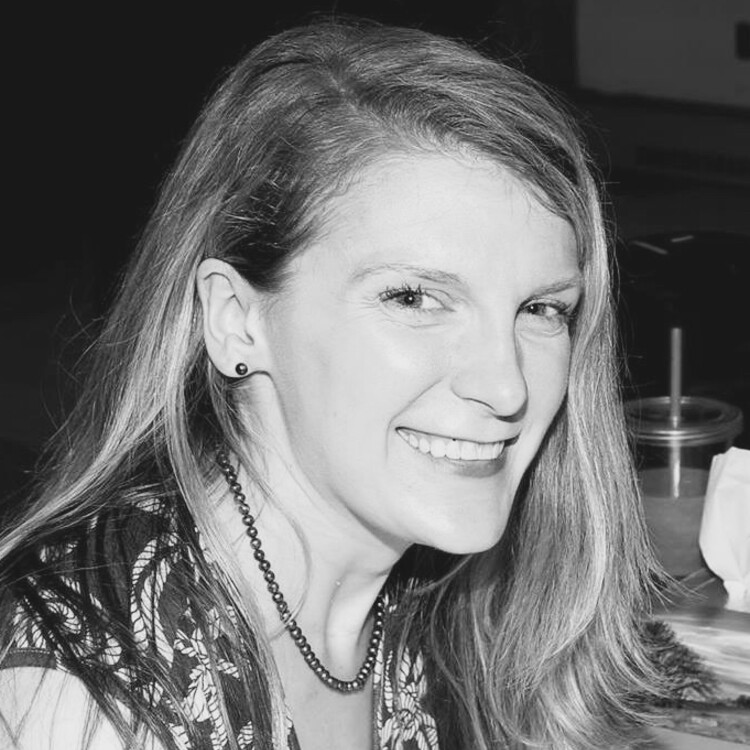
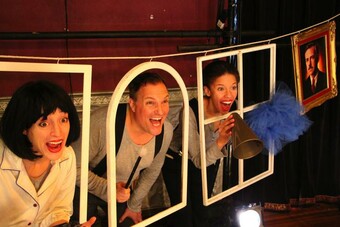
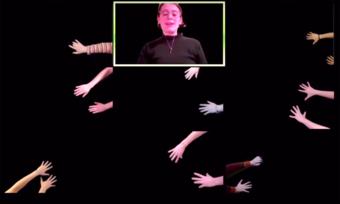

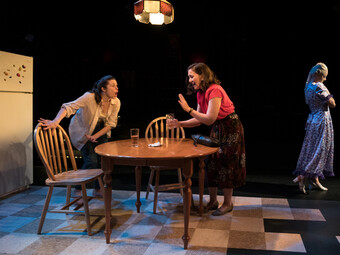

Comments
The article is just the start of the conversation—we want to know what you think about this subject, too! HowlRound is a space for knowledge-sharing, and we welcome spirited, thoughtful, and on-topic dialogue. Find our full comments policy here